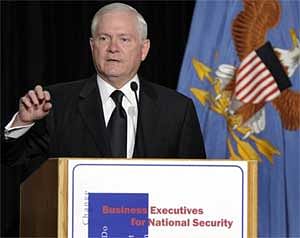US announces new export control regime

The plan to reform the current export control regime, Defence Secretary Robert Gates said on Tuesday, relies on four key reforms - a single export control list, a single licensing agency, a single enforcement coordination agency and a single information technology system.
Transition to the new regime would be carried over three phase in course of the next years, he said.The announcement came after an inter-agency review of the export control system, which calls for fundamental reform of the current one in order to enhance US national security and strengthen ability to counter threats such as proliferation of weapons of mass destruction, a White House fact sheet said.
Existing export control regime was being considered as a major hindrance in the Administration's effort to double America's export in the next five years.
"The current export control regime impedes the effectiveness of our closest military allies, tests their patience and goodwill and hinders their ability to cooperate with US forces - and this at a time when we count on allies and partners to fight with us in places like Afghanistan and potentially elsewhere," Gates said.
Although the US has one of the most robust export control systems, it is rooted in the Cold War era and must be updated to address the threats faced today and the changing economic and technological landscape, the White House said.
The inter-agency assessment found that the current US export control system does not sufficiently reduce national security risk as its structure is overly complicated, contains too many redundancies, and tries to protect too much, it said.Gates said a single export control list will make it clear to US companies which items require licenses for export and which do not.
This single list, combined with a single licensing agency, would allow US to concentrate on controlling those critical technologies and items - the crown jewels - that are the basis for maintaining its military technology advantage, especially technologies and items that no foreign company or government can duplicate.
Items having no significant military impact or those using widely available technology could be approved for export quickly."We envision a more dynamic tiered control system, where an item or technology would be cascaded from a higher to a lower level of control as its sensitivity decreases," he said. A single licensing entity, which will have jurisdiction over both munitions and dual-use items and technologies, will streamline the review process and ensure that export decisions are consistent and made on the real capabilities of the technology, the Defence Secretary said.
This single entity would also reduce exporters' current confusion over where and how to submit export license applications, as well as which technologies and items are likely to be approved.
Gates argued that the coordination of currently dispersed enforcement resources by one agency will do a great deal to strengthen enforcement, particularly abroad, as well as coordination with the intelligence community.
"Those who endanger our troops and compromise and our national security will not be able to hide behind jurisdictional uncertainties or game the system. Violators will be subject to thorough investigation, prosecution and punishment severe enough to deter law-breaking," he said.
Finally, the single unified IT infrastructure will reduce the redundancies, incompatibilities and waste of taxpayer money that the current system of multiple databases produces.
For example, a single online location and database would receive process and help screen new license applications and end users, he said.
"Of course the question of which end users are eligible to receive our technology is a critical national security concern. An essential component of the reformed system is the list of entities - terrorist organisations, rogue states and others - that cannot be allowed access to sensitive items. This would deny them technology or force them to acquire it through a more difficult - through more difficult routes," Gates said.
A single, frequently updated list, which would facilitate compliance and tracking, was proposed to consolidate current lists of banned end users, he said, adding entities could be added if there was reasonable cause to believe that their involvement would affect US national security.
The US will at the same time retain the ability to impose economic sanctions on any foreign country or group, to include prohibiting export of any equipment, material or technologies that could have military use.
"We will turn these principles and proposals into action through a three-phase process that will unfold over the course of next years," Gates said.
In the first phase, the executive branch will begin the transition toward the single list and single licensing agency, by making significant improvements to the current system.
These efforts would include establishing criteria for a tiered control list and standing up an integrated enforcement centre, the Defence Secretary added.